Comment
Transplant Of Foreign Organs
The colonial experience has made the question of imitation a particularly sore one for African countries. No self respecting African nation or leader wants to admit that his way is not totally original.
It might be said that the Japanese have not done too badly out of copying from originals and they have shown that it is possible to use other people's inventions and not only improve upon them but reap greater dividends than the originators.
A lot of precious time and energy is wasted each time in a search for a form of government to suit what is said to be our peculiarly African needs. It is not considered useful that Africa can take advantage of the experience of other nations instead of wasting time searching for new formulas.
It has become the accepted wisdom that western-style democracy has not had a successful transplant record in Africa.
While that is a proposition debatable on the grounds that nowhere on the continent has the system had a chance to be properly nurtured, it might be useful to take a look at other institutions that have made the journey from the West to Africa.
The civil service is not an indigenous African institution and it seems to have fared reasonably well even if it tends to suffer from the same bureaucratic entanglements in a more acute form and an inability to move fast that afflicts the original.
Nobody is unduly worried or feels the need to be apologetic that the service that runs the various countries through all the various changes of government, is not an indigenous institution.
The fact that we have governors of central banks and operate western-style banking has not been known to adversely affect our pride, or accounting methods.
The legal service and the judiciary have by and large made a reasonably successful transplant, why they have to cling to the wigs and gowns in the heat of the tropics and the other quaint practices will remain a perpetual source of bafflement to many. Judges have in the main behaved in the way society expects them to and the majority of the people have built up and retained confidence in the courts of justice. Every once in a while incidents have occurred that have undermined that confidence but they have been the fault more of a few individuals than of the system.
For all the bashing that western style education has had, it has succeeded in arousing the consciousness of quite a number of people that have gone through the educational institutions enough to question accepted notions in society. A by-product possibly being that Africa is producing more and more professionals in all spheres of life who can hold their own against their colleagues anywhere in the world.
The one institution that bears no resemblance to the original is the military. The western-style military is recognisable in Africa only as far as the names of the ranks go. The Sam Browne belts, the boots, the ceremonial red tunics, the ribbons, the batons are all there and on occasion the Nigerian Armed Forces or Ghana Armed Forces can even turn out a decent enough parade to rival the best anywhere.
Unfortunately, beyond the marching, polishing of shoes and the shouting of commands, not much else can be seen in the institution as it exists in Africa.
While the western countries and eastern ones for that matter, are very discerning in the selection of those that serve as officers in their Armed Forces, in Africa the military has been the place of last resort for dropouts and failures. While the utmost integrity is demanded from officers and the word of an officer is taken as that of a gentleman in the parent armies, the African imitations have provided sanctuary for rogues and questionable characters.
Even the promotion to and holding of ranks in the African armies bears no resemblance to the practice in the parent armies thus we have African colonels and generals who can at best be only lieutenants and captains in other armies.
Somehow the concept of the duties of the Armed Forces failed to make the transition to Africa and the African soldiers have written their own rule books which entitle them to be the arbiters of public morality.
At its most tragic and incompetent examples the attempts at Western-style democratic government in Africa do at least bear some resemblance to what they try to follow, but when it comes to the military we have a classic case of trappings without the substance.
There is nothing in indigenous traditional African society that look or sound like the modern armies that exist on the continent today and if ever there has been a transplant that has assumed a life of its own and everything that the parent has not got, it is the military in Africa.
Possibly when the debate continues to rage about the fate of western style democracy in Africa, it might be worthwhile to examine the other western institution that came to Africa from the colonial masters which for some unknown reasons is not living up to its expectations.
If there is one institution that has failed in its transplant in Africa, it is the military. It will have to be property westernised or disbanded because there is nothing African in their behavior.
